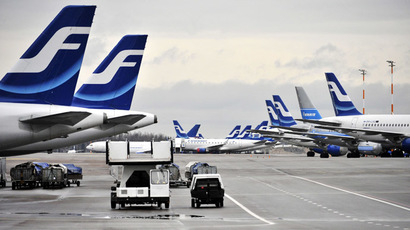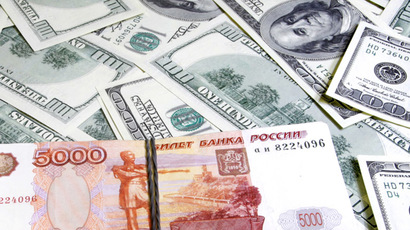Russia bans agricultural products from EU, USA, Australia, Norway, Canada
Russian PM Dmitry Medvedev has signed a decree on the full ban for imports of beef, pork, poultry meat, fish, cheese, milk, vegetables and fruit from Australia, Canada, the EU, the US and Norway.
The ban will last a year, starting August 7.
The full list of banned products was published on the Russian legal information website.
READ MORE: Putin bans agricultural imports from sanctioning countries for 1 year
The Prime Minister also said Russia has stopped transit flights by Ukrainian airlines to such destinations as Georgia, Azerbaijan, Armenia and Turkey, adding that the country was considering a ban of transit flights for European and US Airlines to the Asia-Pacific region.
Western sanctions were a “dead-end track”, but Russia has been forced to respond to the measures taken by the western countries, Medvedev added.
Alcohol imports from both the EU and the US will not be restricted.
“We are actually speaking of an embargo on imports of whole categories of products from countries which have introduced sanctions against Russian organizations and individuals,” Medvedev said.
Dmitry Medvedev instructed the Federal Customs Service (FCS) to see that the banned imports could not cross the Russian border.
The Russian PM has also warned against possible attempts to use the situation to drive up prices.
"I would like to warn that attempts to gain from price speculation in this situation will be roughly stopped," Medvedev said.
The Russian PM added that Moscow still had a lot of trading partners abroad, which it had not placed on the retaliatory sanctions list.
Russia’s agricultural watchdog Rosselkhoznadzor has announced plans to increase imports from Chile, which could include vegetables, fruit, fish, shellfish, meat and milk.
“Imports of fish, which last year amounted to 53,000 tons, may grow two or three times. Shellfish imports might increase from 3,000 tons to 15,000-20,000 tons,” the watchdog said in a statement.
Medvedev said he sincerely hoped"our partners’ economic pragmatism will prevail over bad political decisions, and they will think before trying to frighten Russia and impose restrictions on it. And mutual trade and economic partnership will be restored in the volumes which existed before. We would have liked that to happen.”
In 2013, Russia imported $6.7 billion of meat and meat products in total. The largest suppliers came from now-banned countries like Denmark (6.6% of total Russian meat products), Germany (6.4%), USA (5.3%), and Canada (3.8%).

Unique opportunity
Medvedev believes the year-long embargo Russia is imposing will boost domestic agriculture. He acknowledged that Russian farmers would have to come a long way, but said it was a unique opportunity to develop facilities to substitute for imports.
“We are only lagging behind in production of certain varieties of meat and milk. We have to catch up and our farmers are ready to do so, especially if we help them.”
Triggered by the ban, Russia’s domestic production of agricultural products could grow by about $10.8 billion in the next 18 months, Russian Agriculture Minister Nikolay Fyodorov, told ITAR–TASS.
The Governor of the Krasnodar Region, Aleksandr Tkachev has been quick to react to the news by saying farmers in the region will use the chance to replace imported goods with their own produce.
“I have spoken to the heads of agricultural enterprises, concerning the presidential decree on the ban of imports of Western agricultural goods,” Tkachev said, as cited by ITAR-TASS. “The mood is on the whole optimistic. Krasnodar farmers have received a strong stimulus to use all of their potential.”
Krasnodar is already a big agricultural player in Russia. The region is the third biggest producer of meat and eggs in the country and the fourth biggest producer of milk.
The Astrakhan Region in Russia’s south also said it was ready to increase agricultural production by 20–25 percent next year.
“There’s a real possibility that all the low quality goods, which have been imported, will not appear on the Russian market again. The country’s agriculture is now being given a historic chance for a breakthrough, to increase production, the variety of goods, and to improve processing technology,” the Governor of the Astrakhan Region Aleksandr Zhilkin, told ITAR-TASS.
Banning certain imports from the West will provide “historic opportunities” for Russia’s more distant territories in the Ural Mountains and in the Far East.
“Russia is the richest country in the world and has unique marine resources that unfortunately go abroad. However, the demand for these products on the international market are very high,” Irina Yarovaya, a Duma member from Kamchatka, said.
The new rule will help Russia develop its agriculture sector and make it easier for Russian farmers to market their products, Igor Rudensky, head of the Duma Committee on Economic Policy, Innovation and Entrepreneurship said.














